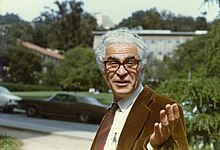Maxwell Rosenlicht | |
|---|---|
 | |
| Born | April 15, 1924 |
| Died | January 22, 1999 (aged 74) |
| Nationality | American |
| Alma mater | Harvard University |
| Awards | Cole Prize (1960) |
| Scientific career | |
| Fields | Mathematics |
| Institutions | University of California, Berkeley Northwestern University |
| Doctoral advisor | Oscar Zariski |
| Doctoral students | Michael F. Singer Robert Henry Risch |
Maxwell Alexander Rosenlicht (April 15, 1924 – January 22, 1999) was an American mathematician known for works in algebraic geometry, algebraic groups, and differential algebra.
Rosenlicht attended high school in Brooklyn (Erasmus High School) and studied at Columbia University (B.A. 1947) and at Harvard University, where he worked under Zariski. He was a Putnam fellow twice, in 1946 and 1947.[1] He was awarded his doctorate on algebraic curve equivalence concepts in 1950. In 1952, he moved to Northwestern University. From 1958 until his retirement in 1991, he was a professor at the University of California, Berkeley. He was also a visiting professor in Mexico City, IHÉS, Rome, Leiden, and at Harvard University.
In 1960, he shared the Cole Prize in algebra with Serge Lang for his work on generalized Jacobian varieties.[2][3] He also studied the algorithmic algebraic theory of integration.
Rosenlicht was a Fulbright Fellow and 1954 Guggenheim Fellow.
He died of neurological disease on a trip to Hawaii. Rosenlicht married in 1954 and had four children.
- ^ "Putnam Competition Individual and Team Winners". Mathematical Association of America. Retrieved December 10, 2021.
- ^ Rosenlicht, Maxwell (1954). "Generalized Jacobian varieties". Annals of Mathematics. 59 (3): 505–530. doi:10.2307/1969715. JSTOR 1969715.
- ^ Rosenlicht, Maxwell (1957). "A universal mapping property of generalized Jacobians". Annals of Mathematics. 66 (1): 80–88. doi:10.2307/1970118. JSTOR 1970118.